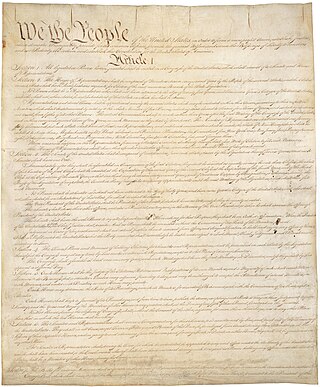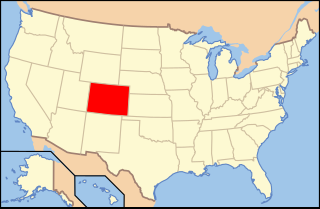Related Research Articles

The United States Virgin Islands, officially the Virgin Islands of the United States, are a group of Caribbean islands and an unincorporated and organized territory of the United States. The islands are geographically part of the Virgin Islands archipelago and are located in the Leeward Islands of the Lesser Antilles to the east of Puerto Rico and west of the British Virgin Islands.

Politics of the United States Virgin Islands takes place in a framework of a presidential representative democratic dependency, whereby the Governor is the head of the territory's government, and of a multi-party system. United States Virgin Islands are an unincorporated and organized territory of the United States, administered by the Office of Insular Affairs of the United States Department of the Interior. Executive power is exercised by the local government of the Virgin Islands. The judiciary is independent of the executive and the legislature.
A constitutional amendment is a modification of the constitution of a polity, organization or other type of entity. Amendments are often interwoven into the relevant sections of an existing constitution, directly altering the text. Conversely, they can be appended to the constitution as supplemental additions, thus changing the frame of government without altering the existing text of the document.

The United States Constitution has served as the supreme law of the United States since taking effect in 1789. The document was written at the 1787 Philadelphia Convention and was ratified through a series of state conventions held in 1787 and 1788. Since 1789, the Constitution has been amended twenty-seven times; particularly important amendments include the ten amendments of the United States Bill of Rights and the three Reconstruction Amendments.

The Corwin Amendment is a proposed amendment to the United States Constitution that has never been adopted, but owing to the absence of a ratification deadline, could still be adopted by the state legislatures. It would shield slavery within the states from the federal constitutional amendment process and from abolition or interference by Congress. Although the Corwin Amendment does not explicitly use the word slavery, it was designed specifically to protect slavery from federal power. The out-going 36th United States Congress proposed the Corwin Amendment on March 2, 1861, shortly before the outbreak of the American Civil War, with the intent of preventing that war and preserving the Union. It passed Congress but was not ratified by the requisite number of state legislatures.
A supermajority, is a requirement for a proposal to gain a specified level of support which is greater than the threshold of more than one-half used for a simple majority. Supermajority rules in a democracy can help to prevent a majority from eroding fundamental rights of a minority, but they can also hamper efforts to respond to problems and encourage corrupt compromises at times when action is taken. Changes to constitutions, especially those with entrenched clauses, commonly require supermajority support in a legislature. Parliamentary procedure requires that any action of a deliberative assembly that may alter the rights of a minority have a supermajority requirement, such as a two-thirds vote.
A convention to propose amendments to the United States Constitution, also referred to as an Article V Convention or amendatory convention, is one of two methods authorized by Article Five of the United States Constitution whereby amendments to the United States Constitution may be proposed: two thirds of the State legislatures may call a convention to propose amendments, which become law only after ratification by three-fourths of the states. The Article V convention method has never been used; but 33 amendments have been proposed by the other method, a two-thirds vote in both houses of Congress; and 27 of these have been ratified by three-fourths of the States. Although there has never been a federal constitutional convention since the original one, at the state level more than 230 constitutional conventions have assembled in the United States.

The United States Virgin Islands, often abbreviated USVI, are a group of islands and cays located in the Lesser Antilles of the Eastern Caribbean, consisting of three main islands and fifty smaller islets and cays. Like many of their Caribbean neighbors, the history of the islands is characterized by native Amerindian settlement, European colonization, and the Atlantic slave trade.

A convention, in the sense of a meeting, is a gathering of individuals who meet at an arranged place and time in order to discuss or engage in some common interest. The most common conventions are based upon industry, profession, and fandom. Trade conventions typically focus on a particular industry or industry segment, and feature keynote speakers, vendor displays, and other information and activities of interest to the event organizers and attendees. Professional conventions focus on issues of concern along with advancements related to the profession. Such conventions are generally organized by societies or communities dedicated to promotion of the topic of interest. Fan conventions usually feature displays, shows, and sales based on pop culture and guest celebrities. Science fiction conventions traditionally partake of the nature of both professional conventions and fan conventions, with the balance varying from one to another. Conventions also exist for various hobbies, such as gaming or model railroads.

The Utah State Legislature is the state legislature of the U.S. state of Utah. It is a bicameral body, comprising the Utah House of Representatives, with 75 state representatives, and the Utah Senate, with 29 state senators. There are no term limits for either chamber.
A joint session or joint convention is, most broadly, when two normally separate decision-making groups meet, often in a special session or other extraordinary meeting, for a specific purpose.

The drafting of the Constitution of the United States began on May 25, 1787, when the Constitutional Convention met for the first time with a quorum at the Pennsylvania State House in Philadelphia, Pennsylvania to revise the Articles of Confederation. It ended on September 17, 1787, the day the Frame of Government drafted by the convention's delegates to replace the Articles was adopted and signed. The ratification process for the Constitution began that day, and ended when the final state, Rhode Island, ratified it on May 29, 1790.

The 2007 United States Virgin Islands Constitutional Convention election was an election to the Fifth Constitutional Convention of the U.S. Virgin Islands in the United States Virgin Islands on 12 June 2007. The convention was the fifth attempt to give the United States territory its own constitution; previous constitutional conventions had been elected in 1964, 1971, 1977 and 1980.

The Constitution of the State of Colorado is the foundation of the laws and government of the U.S. state of Colorado. The current, and only, Colorado State Constitution was drafted on March 14, 1876; approved by Colorado voters on July 1, 1876; and took effect upon the statehood of Colorado on August 1, 1876. As of 2020, the constitution has been amended at least 166 times. The Constitution of Colorado derives its authority from the sovereignty of the people. As such, the people of Colorado reserved specific powers in governing Colorado directly; in addition to providing for voting for Governor, state legislators, and judges, the people of Colorado have reserved initiative of laws and referendum of laws enacted by the legislature to themselves, provided for recall of office holders, and limit tax increases beyond set amounts without explicit voter approval, and must explicitly approve any change to the constitution, often with a 55% majority. The Colorado state constitution is one of the longest in the United States.

A More Perfect Constitution is a book published by American political scientist at the University of Virginia, Larry J. Sabato, in which he proposes a constitutional convention to substantially overhaul the United States Constitution. He points out that after the Bill of Rights, there have only been seventeen constitutional amendments over the past 220 years. He argues that a constitutional convention is overdue and is something that the Founding Fathers would have wanted. He offers 23 proposals for revising the Constitution.

The 2010 U.S. Virgin Islands gubernatorial election was held on November 2, 2010, and won by incumbent Democratic Governor John de Jongh. De Jongh was elected to his first term in 2006 with 57.3% of the vote over Kenneth Mapp.

Gerard Luz Amwur James II is an American Virgin Islander politician, funeral director, and businessman. James served as the Lieutenant Governor of the United States Virgin Islands from 1999 until 2003 and was the president of Fifth Constitutional Convention of the U.S. Virgin Islands.
The Elective Governor Acts of 1968 are a pair of acts passed by the 90th United States Congress in 1968, which provide for the Governor of the U.S. Virgin Islands and the Governor of Guam to be popularly elected, rather than appointed as they had been up to that point. The two acts are individually titled the Virgin Islands Elective Governor Act and the Guam Elective Governor Act. The impetus for the acts came from extensive lobbying efforts by both Guamanians and Virgin Islanders. The Guam Legislature, led by Speaker Antonio Borja Won Pat, had begun lobbying Congress for popular elections in 1962. In the Virgin Islands, the act stemmed from the recommendations of the territory's first Constitutional Convention in 1964–5, which included the popular election of the governor. The acts were seen as a breakthrough for political reform both in Guam and the Virgin Islands. The Guam act was controversial, however, for authorizing federal auditing of the territory's accounts by the Interior Department—a practice that remained in place as of 2020.

A referendum on holding a constitutional convention was held in the US Virgin Islands on 3 November 2020 alongside general elections. 72% of voters responding to the referendum question voted in favor and turnout was above the threshold required.
The United States Virgin Islands are a group of around 90 islands, islets, and cays in the Caribbean region in which inhabitants were claimed by Spain in 1493. No permanent settlements occurred in the Spanish period and the islands were colonized by Denmark in 1671. The inhabitants remained Danish nationals until 1917. From that date, islanders have derived their nationality from the United States. Nationality is the legal means in which inhabitants acquire formal membership in a nation without regard to its governance type. In addition to being United States' nationals, Virgin Islanders are both citizens of the United States and [local] citizens of the Virgin Islands. Citizenship is the relationship between the government and the governed, the rights and obligations that each owes the other, once one has become a member of a nation.
References
- ↑ 2010 Congressional Record, Vol. 156, Page S5138
- 1 2 3 Statement by Gerard Luz Amwur James II, President of the Fifth Constitutional Convention of the U.S. Virgin Islands, to the United Nations Special Committee on Decolonization, June 22, 2010
- ↑ Full-text of Public-law-94-584
- ↑ "Virgin Islands, Virgin Islands Newspaper, A Pulitzer Prize Winning Newspaper, Virgin Islands Guide, Virgin Islands Info". www.virginislandsdailynews.com. Archived from the original on 27 September 2007. Retrieved 17 January 2022.
- ↑ [ dead link ]
- 1 2 Woodrow, Stephanie (March 17, 2010). "DOJ Recommends Changes to Proposed Virgin Islands Constitution". Main Justice. Archived from the original on 2012-03-26.
- ↑ Pub. L. 111–194 (text) (PDF) (124 Stat. 1309)
- ↑ Lou Mattei (Daily News Staff) (September 29, 2012). "Constitutional Convention meeting marred by arguments, technical snarls - News". Virgin Islands Daily News. Archived from the original on 2015-04-02. Retrieved April 8, 2013.
- ↑ Mattei, Lou, Virgin Islands Daily News (October 29, 2012). "Constitutional Convention Meeting Marred by Arguments, Technical Snarls". High Beam Research. Cengage Learning. Archived from the original on February 18, 2017. Retrieved February 16, 2017.
{{cite web}}: CS1 maint: multiple names: authors list (link)